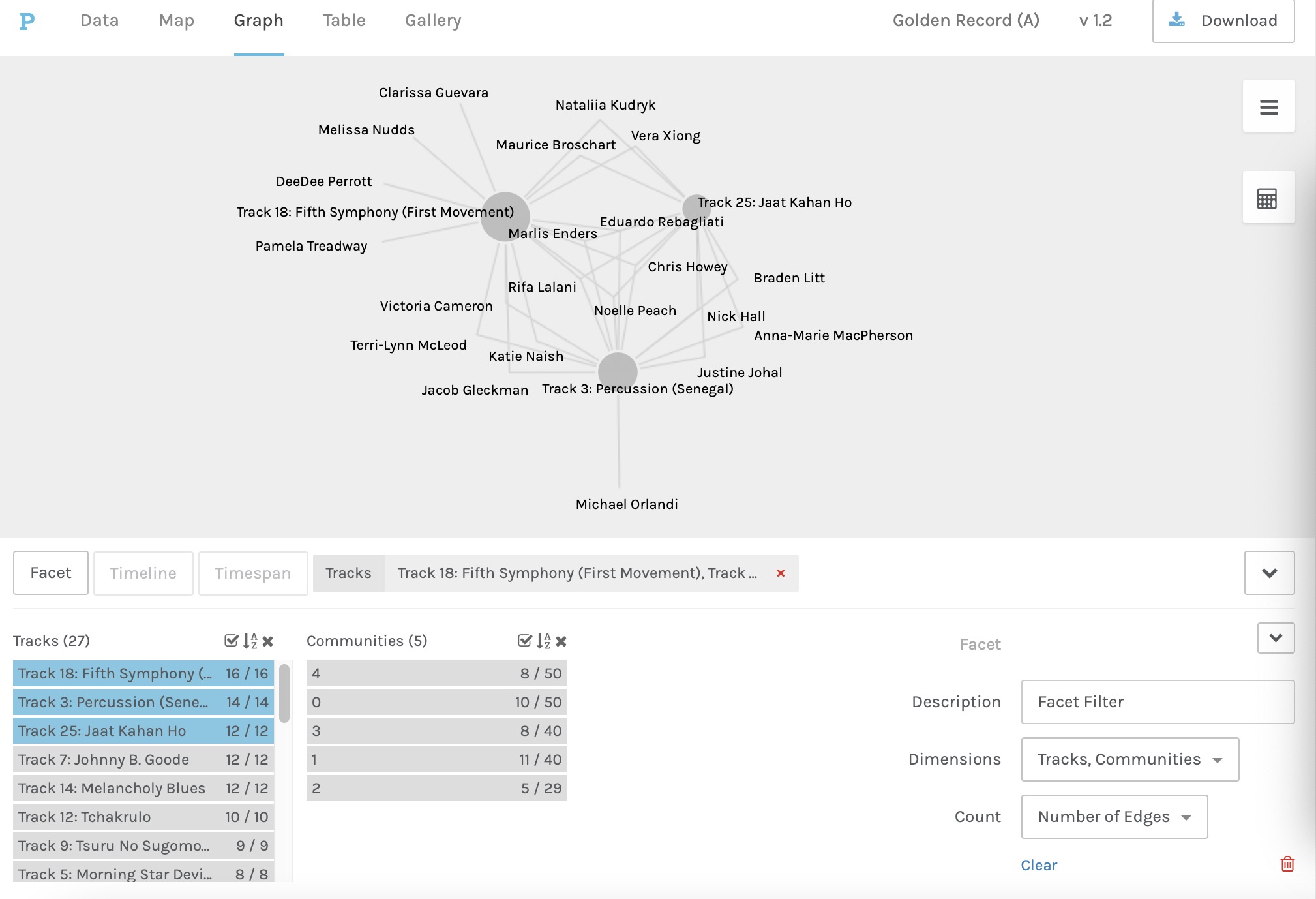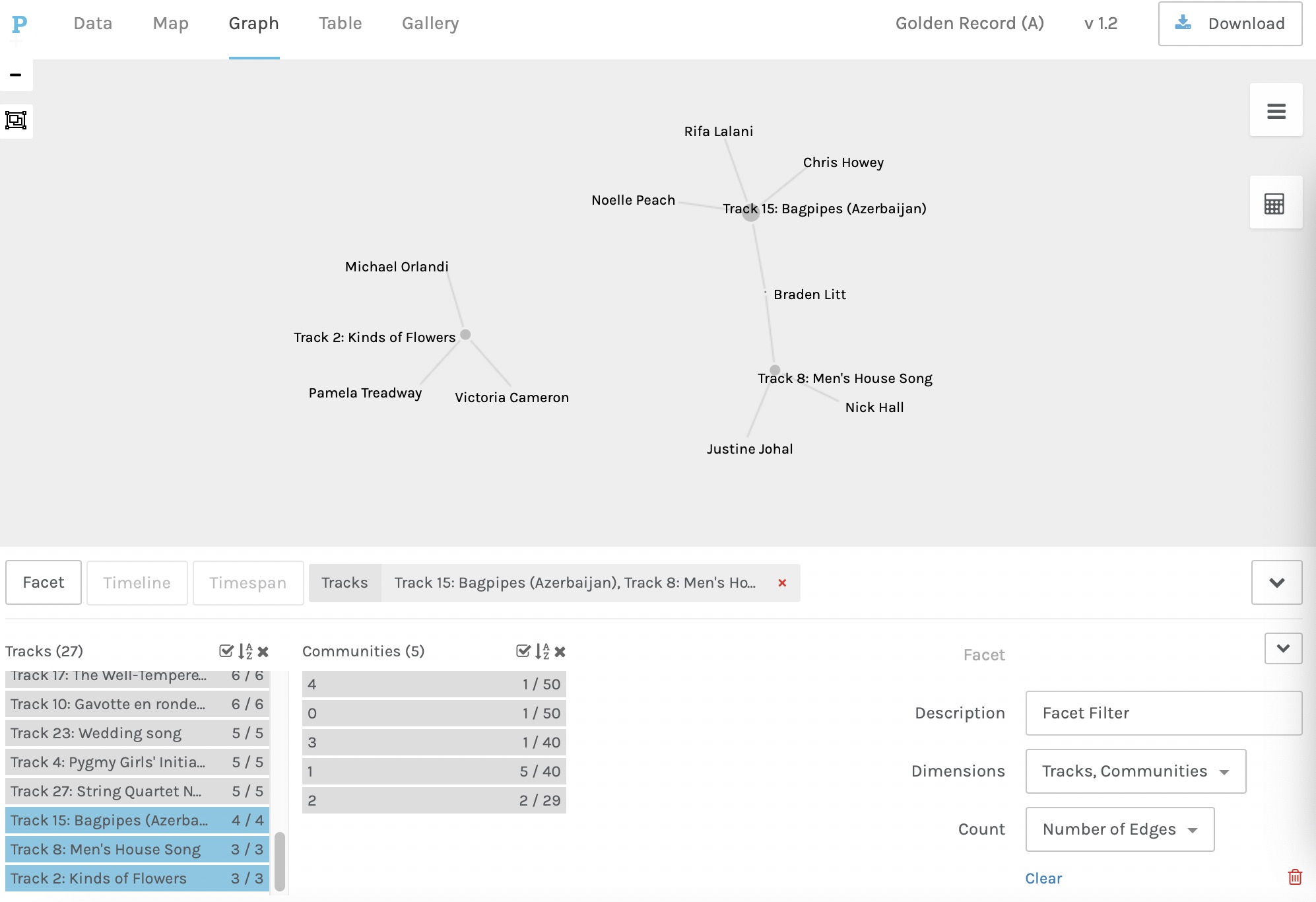I have always been curious about big data analysis, algorithms, and machine learning. These topics have been highly debated in the last few decades. Whether good or bad, we have seen tremendous development in the high-tech industries, like artificial intelligence and machine learning. Module 9 to Module 11 content helps us understand the main differences between the web and the network, more interestingly, it explains how the algorithm works and how it affects our lives.
When I first opened the Palladio graph, I was so lost and didn’t know where to start making sense out of the complicated multi-layered graph. I clicked on every facet dimensions and count dimensions to see if it would affect the layout of the graph. Then I went back to the module videos and reviewed them 2-3 times trying to understand graph theory, network connections, node connectivity, and etc.
Finding #1: within the network graph, the more connections each node has, the more important this node weighs
In my understanding, the top 3 liked music are:
- 16 out of 21 curators selected track #18: Fifth Symphony
- 14 out of 21 curators selected track #3: Percussion
- 12 out of 21 curators selected track #25: Jaat Kahan Ho

In comparison, the least 3 liked music are:
- 4 out of 21 curators chose track #15: Bagpipes
- 3 out of 21 curators chose track #8: Men’s House Song
- 3 out of 21 curators chose track #2: Kinds of Flowers

Analysis & Reflection
Based on the above visualizations, there is no direct or evident implication of why some tracks are well-liked than others. In my assumption, more data need to be collected from curators, in order to figure out the degree of connectivity between edges and nodes. For instance, if data concerning curators’ cultural background and music preference can be collected and embedded into this network, then we may be able to distinguish what factors drive the results.
Likewise, Zeynep Tufekci (2017) reveals the same technology has been applied in business analysis. Through big data analysis, airplane companies can precisely target people who are prone to be more extreme and impulsive to purchase airplane tickets to Las Vegas. Oftentimes, people who fall into these dark patterns are not aware of themselves being set up like fishes falling into a fishnet. Indeed, that’s why it is important to hear from individuals like Tristan Harris and Zeynep Tufekci. They help to raise the general public’s awareness of machine learning, big data, and artificial intelligence.
I recall from Tristan Harris’s TED Talk, he mentioned a novel technology called persuasive technology. Why on earth would such technology exist? And causing so much turbulence within our society, especially regarding political issues. It is almost terrifying to think how campaign managers utilize persuasive technology accompanied by big data analysis, to manipulate one’s political view. Glad to know that more people are aware of big data manipulation and privacy information protection. Particularly through the lawsuit against the CEO of Facebook Mark Zuckerberg in December 2020.
The majority of people believe technologies make our life easier and more convenient. Yes indeed, I have no doubt on the positive front. We rely on social media platforms to connect with distant families and friends. When it comes to ethical, political, and cultural matters which may affect society as a whole, Harris (2017) wisely suggested that “We need new models and accountability systems. We need to design renaissance ability to focus.” Including Roger Mcnamee (2019) who mentored Mark Zuckerberg in the last decade, he left Facebook and now advocates democracy, regulation, as well as privacy among these IT tycoon companies, such as Amazon, Facebook, and Google.
References
Harris, T. (2017). How a handful of tech companies control billions of minds every day. Retrieved from https://www.ted.com/talks/tristan_harris_the_manipulative_tricks_tech_companies_use_to_capture_your_attention?language=en
Tufekci, Z. (2017). We’re building a dystopia just to make people click on ads. Retrieved from https://www.ted.com/talks/zeynep_tufekci_we_re_building_a_dystopia_just_to_make_people_click_on_ads?language=en (Links to an external site.)
Mcnamme, R. (2019). I mentored Mark Zuckerberg. I loved Facebook. But I can’t stay silent about what’s happening. Retrieved from here.